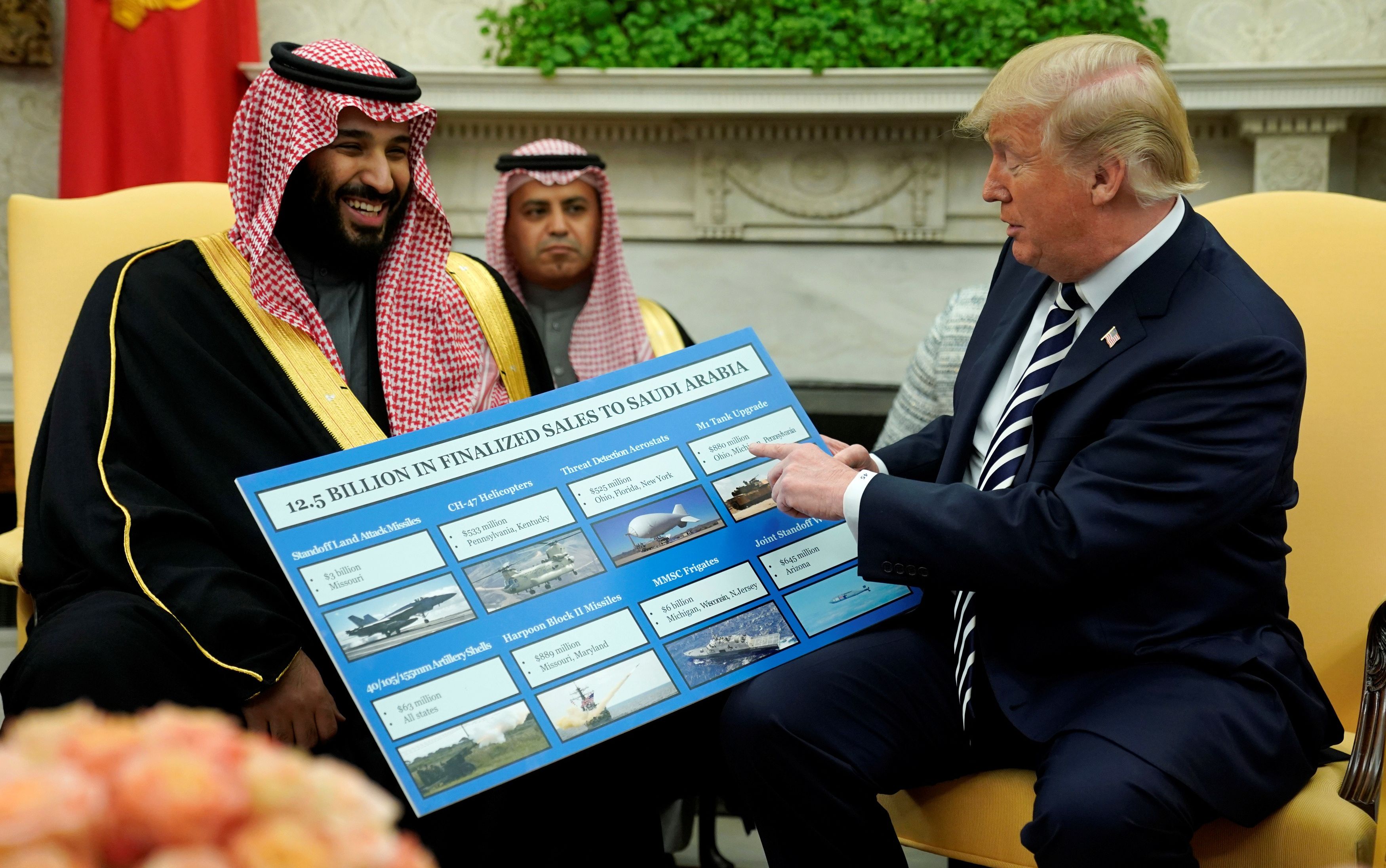President Trump is working on delivering what could be a big win for U.S. arms contractors. Politico Pro reported on Thursday that the White House is currently “drafting an executive order aimed at streamlining the federal government’s process of selling weapons overseas.”
The text of the executive order has not yet been released, but a source familiar with the order confirmed it will boost arms contractor interests and reduce congressional oversight by stripping down parts of the Arms Export Control Act (AECA), the law that governs the arms export process.
Close observers of the process say the order may track some initiatives promoted by the Biden administration, but worry about the possibility of significant weakening of the AECA. Among the Biden efforts to speed arms sales was the use of a “Tiger Team” to eliminate bottlenecks that were seen as slowing weapons deliveries to Israel. Former State Department official Josh Paul, who resigned over continued U.S. arms supplies to Israel despite its campaign of mass slaughter in Gaza, criticized Biden’s move.
“This shows that at all levels of government, from policy to implementation, the Biden Administration is doing all it can to rush arms to Israel despite President Biden’s recent explicit statement that Israel’s bombing of Gaza is ‘indiscriminate,’ and despite extensive reporting that the arms we are providing are causing massive civilian casualties,” he said back in December 2023.
The question is how widely a Trump administration initiative to rush weapons out the door will be applied, and how consistently it will be enforced. Given evidence to date from other policy areas, the Trump administration is likely to vigorously implement any pro-industry provisions of the new executive order. But only the formal release of the order will reveal how big a change the new policy will be from the Biden administration’s approach.
The arms industry is “helping shape” the order, according to Politico. Arms manufacturers — who have long criticized the Foreign Military Sales program — now see their opening to push for cutting what they see as red tape, but which may include further reducing essential human rights vetting of proposed sales, spurred by a newfound emphasis on government efficiency.
In January, General Atomics CEO Linden Blue wrote a letter to the Department of Government Efficiency criticizing “buck-passing” in the foreign military sales process and regulations on missiles and unmanned drone exports. Blue said that “execution is fragmented across the Department of State, multiple DoD agencies, and the military services, with none of them able to direct the others.” The new executive order will likely minimize the State Department’s role in the foreign military sales process while giving more deference to the Pentagon.
And it seems like Trump is listening. Out of one side of his mouth, the president lambastes the defense industry and their proponents as war profiteers; “I will expel the warmongers from our national security state and carry out a much needed clean up of the military industrial complex to stop the war profiteering and to always put America first,” he said on the campaign trail in Milwaukee.
Some inside the beltway appear to take this threat to arms exports seriously, namely in response to Trump's decision to pause funding to Ukraine. In an article titled, "How Trump is Killing the US Defense Industry,” an Atlantic Council senior fellow sounded the alarm that the "erosion" of the military industrial-complex had arrived, pointing to Lockheed Martin's stock dropping from $500 a share to $450.
But out of the other side of his mouth, Trump extols his record in enabling the very same warmongers to sell arms to destabilizing regimes. His first trip abroad as president in 2017 was to Saudi Arabia, which was then engaged in a military intervention in Yemen, where he proposed a staggering $110 billion arms sale. Major arms sale notifications reached an all time high, adjusted for inflation, under Trump’s stewardship. The Biden Administration continued the breakneck pace of sales set by Trump, despite policies on paper that acted as little more than a fig leaf to elevate human rights and civilian harm into consideration of the arms exports process.
Back in office, Trump has picked up right where he left off, with over $17 billion in major arms sales approved so far this year. On Thursday, the State Department announced the approval of another 2,000 laser-guided rockets to Saudi Arabia.
The AECA gives Congress authority to block major arms sales by passing a joint resolution of disapproval. This has yet to happen, since Congress would need a veto-proof majority; Congress invoked the AECA in an attempt to block arms sales to Saudi Arabia in the wake of the murder of Washington Post journalist Jamal Khashoggi, only for Trump to promptly veto its effort. He justified his continued arming of Saudi Arabia because of the revenue it brought to major U.S. weapons contractors like Raytheon (now RTX) and Lockheed Martin — companies that produced bombs used by the Royal Saudi Air Force that were involved in prominent cases of killing of civilians.
It’s unclear what aspects of the AECA may be stripped, but defense contractors need more oversight, not less. Other Trump administration initiatives that may aid arms exporters large and small were decisions to suspend enforcement of laws prohibiting overseas bribery by U.S. companies, and revealing the beneficial owners of shell companies that are used for everything from money laundering and illicit arms trafficking.
Congress should oppose efforts to make it easier to export weapons by further reducing government vetting. Given the frequency with which U.S. weapons end up with aggressor nations and anti-democratic regimes, this is no time to be rushing them out the door without careful consideration of whether they serve long-term U.S. interests or foster peace and stability in key regions.
















